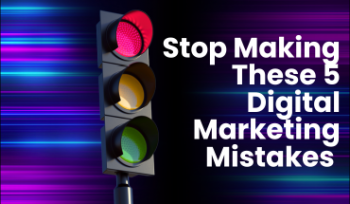10 Ecommerce SEO Mistakes You Are Making
Published on February 05, 2019
Have you just painstakingly built your online store, but aren’t seeing the results you desire? Chances are, you may have made one of the common ecommerce Search Engine Optimization mistakes! With continuous Google algorithm updates, old strategies may be playing a bad joke on your rankings, while flashy visual effects may be actually harming your business.
Take a look at our list of the 10 most common mistakes in ecommerce strategy, compiled by our marketing experts at Xi Digital.
Top 10 Mistakes in Your Ecommerce SEO Strategy
1. Not Taking Your Audience into Account When Researching
This is one of the most common mistakes among search engine marketers. Many ecommerce businesses focus too much on finding keywords that are relevant to their products, yet they completely forget to look for keywords that their target audience is actually searching for.
Researching keywords should be based on unique questions that the audience might type into a search engine. Often, these are long-tail keywords, such as “dark green man’s hiking backpack” or “left handed golf clubs for children”. In fact, such keywords are easier to rank for, as they have less competition than general keywords. Once you find your keywords, target them in your product pages or create relevant blog articles as part of your content marketing strategy.
2. Spamming Your Own Content
With major updates to Google’s algorithms in recent years, keyword stuffing has become obsolete. If you are an ecommerce business with unnaturally stuffed URLs, meta tags, product descriptions, or other content, you are more likely to see a drop in your rankings, rather than a boost.
At the same time, keyword spamming is bad from the user experience perspective (UX). Even if you did have enough keywords to get to the top of the search results, you would still need to make a sale. This is much easier to accomplish with informative, valuable content rather than with paragraphs of repeated keywords.
3. Duplicate Content
Google admits that displaying pages with unique information is a major priority for them. That is why they are continuously making efforts to sort out content that has been deliberately copied across domains.
Of course, there could be reasons why your website could contain copied content, but, nevertheless, it would still negatively affect your SEO. As tempting as it is to just use the product description from the manufacturer on your website, don’t.
In addition, avoid repeating your boilerplate across the website. If you did end up with some duplicate content, you can use 301 redirects, so that the Googlebot knows where to go. Alternatively, you could add a canonical tag to indicate that the specific page represents the master copy of the duplicated content.
4. Lacking Product Reviews
As mentioned before, ecommerce SEO is not all solely about getting your pages to rank. Once people click on your link, you still need to convince them to buy the product.
Product reviews are one of the most powerful ways to do this. In fact, according to Econsultancy, 61% of consumers will read reviews prior to making a purchase, and good reviews will likely drive them to buy the product.
Furthermore, review pages can serve as fresh content. They are a great way to rank for the long-tail keywords we mentioned earlier. Simply add “product review” to the keyword set, and enjoy the SEO boost.
5. Forgetting to Optimize URLs
Keywords found in URLs not only aid search engines in understanding what the page is about, but also help searchers choose your result among others. Yet, many ecommerce marketers still use non-descriptive URLs that include product numbers or codes rather than keywords. If you do feel like you need to use the product number, opt for a blend of the two. For example, “/product/1233494/childrens-mittens” is still better than “/product/1233494/”.
6. Not Speaking HTML
When the Googlebot crawls your ecommerce website, all it reads is HTML. This is why even the images need to have some HTML associated with them, so that Google will be able to define what they are about. It’s important to make sure that all of your images have natural ALT tags. These tags shouldn’t be optimized for keywords, unless the keyword is actually relevant to the image.
There are also many ecommerce website design features that can make your website look cool, but are unreadable for Google (e.g. Flash). Here, moderation is key. Using too many of these features can harm your site’s SEO and lower your page’s loading speed, which is a main ranking factor for Google.
7. Having a Slow Website
Another ecommerce SEO problem caused by fancy features is the site load speed. Graphics and cool elements may look fun, but they can also make your site too slow – which will reduce your rankings and cause poor user experience.
This seems to be a common problem among ecommerce sites in particular. According to Website Magazine, 40% of website visitors abandon a site if it takes over three seconds to load. That being said, slow load speeds should be avoided as much as possible. Therefore, having a slow site would increase your bounce rate, which, in turn, will hurt your rankings.
8. Missing Internal Links
Ecommerce sellers can take advantage of the fact that Google likes content that links back to other high-quality content. If you have a blog on your website, make sure that your articles include internal links to other relevant high-quality pages. In addition, use relevant keywords as your anchor text. This will help Google determine what your article is about. However, avoid using the same keywords for your anchor text on the same page, as it can harm your ecommerce SEO.
Linking to other related content on your site will also help your visitors find relevant content more easily, which will reduce the overall bounce rate.
9. Obsessing about Ranking
Ecommerce SEO is not only about getting to the top of search results. It is about getting traffic that will eventually turn into sales.
As such, ecommerce businesses need to think about their SEO alongside other marketing tools, such as content marketing or social media. For example, a content marketing flaw, such as lack of calls-to-actions, can make your SEO efforts less effective.
Nowadays, Google takes into account a variety of other factors apart from traditional SEO strategies, like site structure, keywords, or backlinks. This is why you should think about SEO in terms of a broader marketing perspective.
10. Not Having Security Encryption
Finally, lacking security encryption (HTTPS) is a major mistake made by ecommerce businesses. The SSL certificate is needed to protect your customers’ information when they make transactions, and is absolutely crucial to customer experience.
Google tries to provide users with accurate, relevant, and safe results, and having an SSL certificate on your site will likely give you a good ranking boost.
Count on Xi Digital for Professional Ecommerce Marketing Services
Avoiding these 10 mistakes will definitely improve your website’s performance on search engines, but ecommerce SEO isn’t that simple.
Search Engine Optimization is an art. Our team is always staying up-to-date with the latest Google algorithm updates, adapting websites accordingly, balancing between SEO and other marketing strategies and continually improving and trying new things.
Let our SEO experts use their magic, while you sit back and watch your ecommerce business grow. Visit Xi Digital to learn more or fill out a business assessment form to get in touch. We can’t wait to help you optimize your ecommerce site!











